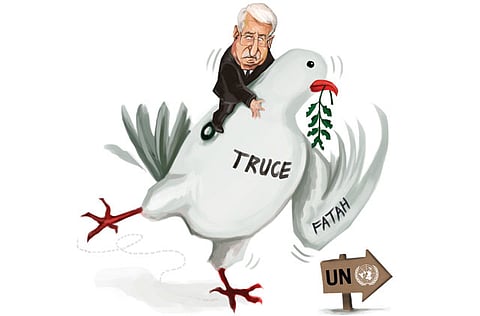Abbas sure to fail at UN without Hamas backing
Nobody will take the Palestinian president seriously if he goes to the UN, or demands renewed US mediation, in his current weak state

Palestinian National Authority President Mahmoud Abbas is entangled in three critical but faltering relationships with Hamas, the United States and Israel. How he reconciles them will determine whether Israelis and Palestinians resume talking or fighting in the months ahead.
Last Tuesday, Abbas announced that he was disillusioned by more than two decades of failed mediation by the US and would instead seek Palestinian statehood at the United Nations Security Council. If he doesn’t win a commitment from the Security Council to end the Israeli occupation of the West Bank, Gaza and Occupied east Jerusalem within three years, he plans to bring Palestinian grievances to the International Criminal Court and other global institutions.
The problem is that Abbas lacks the political assets and credibility to get very far with such ultimatums. His most serious immediate problem is his erratic relationship with Hamas, which is riding high in Palestinian and Arab public opinion polls after its performance in the recent battle with Israel. Unless Palestinians unite under his leadership, Abbas will never have the legitimacy to negotiate anything. Moves towards unity broke down yet again last weekend after a spat broke out over whether Hamas intended to implement fully the “reconciliation agreement” signed with Abbas’s Fatah faction. The accord had led to the formation of a technocrat-led government in June, which was supposed to manage all public affairs in the West Bank and Gaza, including security and finances. In return, Hamas agreed to disband its administration in Gaza.
In an interview on Saturday in Cairo, Abbas accused Hamas of refusing to dismantle its governing structure in Gaza or to turn over its weapons to the PNA. When Abbas threatened to withhold the salaries of Gaza officials, Hamas accused him of playing into the hands of the Israelis and Americans.
As in the past, the immediate rift will probably be patched up, mainly because the majority of Palestinians deeply desire an effective unity government. Both camps know very well that each is weak on its own. Fatah’s diplomatic approach has yielded zero results in 20 years of negotiations. While Hamas has forced Israel to accept ceasefires in the last three military confrontations, the group is broke and unable to improve living conditions for Palestinians in Gaza, who essentially survive on international aid.
Beneath this political tiff, though, lies a deeper disagreement about how Palestinians should battle for their national rights. Several statements by Hamas leaders in recent years, as well as the 2006 National Reconciliation Document that still binds them along with Fatah and three other Palestinian factions, indicate that they share the goal of a Palestinian state in the West Bank, Gaza and Occupied east Jerusalem, if refugee claims are also resolved. Whatever the outdated Hamas charter says about Israel, the group’s leaders have pledged to accept a two-state solution if a majority of Palestinians approve one in a referendum.
Political options
The question is how to get there. Hamas and others argue that only credible military deterrence — such as disrupting Tel Aviv’s Ben-Gurion International Airport, as happened briefly last month — will force Israel to negotiate seriously. Abbas sees negotiations that involve the Security Council as the best route to statehood. Several strategies that fall somewhere between those two positions have been tried in the past with limited success, including local uprisings, nonviolent civil disobedience, and pressuring Israel through international rulings, boycotts and sanctions.
The option that many Palestinians now eye would combine elements of all these approaches. Hamas would maintain an indefinite ceasefire in order to allow political options to show their promise, whether at the UN, in a Madrid-like international conference or in bilateral talks. For any such channels to succeed, though, Fatah and Hamas would have to move beyond their shaky truce and create a single, unified Palestinian leadership. This can only be achieved by reviving the institutions of the Palestine Liberation Organisation, which represents Palestinians everywhere but has been moribund since the 1993 Oslo agreements created the PNA. If Abbas goes to the UN or demands renewed US mediation in his current weak state — lacking both full national legitimacy and a credible military deterrent — he would be laughed out of any room he entered. He would be taken much more seriously if he engaged diplomatically with the backing of Hamas, all Palestinian factions, and the 5 million refugees abroad who are represented in the PLO’s National Council, or parliament-in-exile. Palestinians should give him that much if they want any chance of success.
—Washington Post
Rami G. Khouri is director of the Issam Fares Institute for Public Policy and International Affairs at the American University of Beirut.


